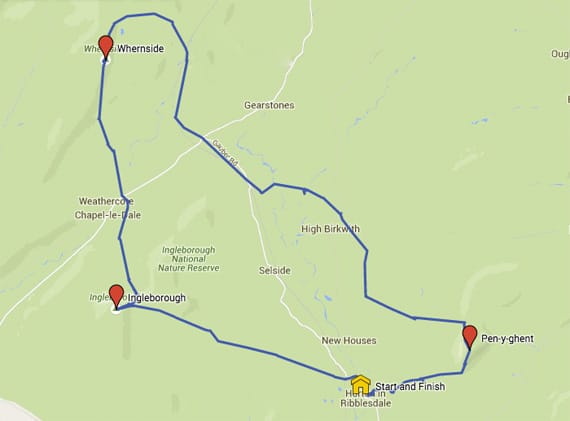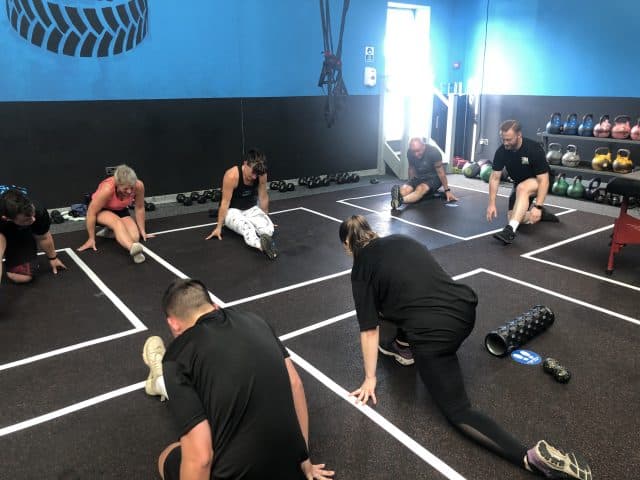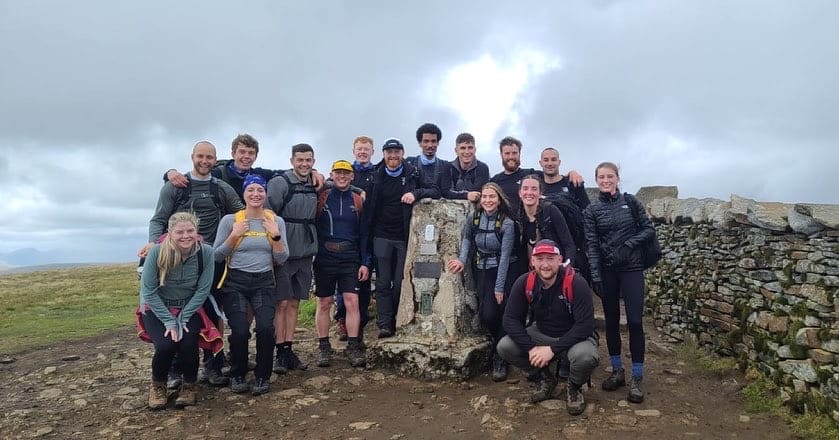Introduction
The Yorkshire 3 Peaks Challenge was indeed a challenge. Not only do you need to climb the 3 largest peaks within the Yorkshire dales, consecutively, on a circular route of over 24 miles, all within 12 hours.
Given what it involves, it is probably then I quickly understood the importance of preparing for the distance both physically and mentally too. Unfortunately, there were participants that underprepared for this challenge which inevitably ended in injury and for some not being able to continue the challenge.
Hearing from friends, family, colleagues, and clients of their experiences, I undertook a training programme that included over 100miles of walking around the Peak District but also a change in my training within the gym especially to improve the endurance characteristics of my lower limbs

Are you wanting to complete the challenge?
In short, if you are feeling spontaneous for this challenge, and you want to complete the Yorkshire Three Peaks challenge without training… it is possible. But it is not ideal, so train if you can. Do not underestimate the endurance required to walk for 12 hours!
To our delight though, we completed it in just over 10 hours, starting at 07:50 and finishing at 18:15, which is wonderful! Even better, we were able to raise an amazing £10,500 for our chosen charity: Endeavour. CLICK HERE to discover the amazing work they do to provide educational and career opportunities to young adults in South Yorkshire.
So, what did I learn?
There is no greater way to pass on advice for future participants to prepare for challenges such as the Yorkshire 3 Peak challenge. Therefore, I have rounded up the following key points to provide you (if you have made it this far) to help you prepare to ensure you get the most out of yourself, enjoy the challenge and minimise injury risk.
How to prepare:
- Nutrition
This can arguably be one of the most important factors in terms of during the event. I was fortunate to be able to have a network of nutritionists such as Mission Nutrition and Personal Trainers such as Mud & Muscle, to pass on some great advice to maintain energy levels over such distance (which accumulated to over 4,000 calories being burnt throughout the day!).
This includes plenty of water, gels, flapjacks, and protein bars and we were even fortunate to receive bacon sandwiches and cheese and pickle sandwiches at each checkpoint (thank you Endeavour!).

- Mental toughness
Mental toughness in terms of completing this challenge was not just for the sharp inclines of Ingleborough and the long progressive incline from Whernside (2 hours!) but also the extended periods of walking (3-4 hours) between the first and second peaks (Penyghant – Whernside). Fortunately, completing this challenge with my university friends from 3 years ago encouraged thinking less of the challenge and more about catching up. However, there were periods of self-doubt, not wanting to continue and even thinking: shall I just walk back now, I am not cut out for this! Regardless, I kept my eyes on the end goal, visualising how it feels to complete the challenge and cross the finish line which was made possible!
Training
Training, alongside the nutritional and psychological preparation, should be highly regarded to ensure that you can participate safely and at your best! Therefore, understanding the characteristics of long periods of walking, climbing, and descending the peaks.
This section is of course of great importance to me as a sports and exercise therapist. This section aims to highlight the characteristics needed to develop to ensure that physically, you can maximise your performance but ultimately, decrease the likelihood of injury. Remember, if you get injured, you are a long way from the start/finish line and, if you are fortunate to have a guide, they will have to take you back and then make their way back towards the challenge to catch up with the rest of the group. Now, I am sure you do not feel like a burden but do want to complete the challenge as you set out to do in the first place.
- Flexibility and Mobility
Flexibility and mobility play an important role in terms of being able to seamlessly climb and descend through the various terrains you are faced with. In context, being able to climb up Ingleborough involved near-vertical ascending in which you are required to step up and over large rocks, and stones. This means optimal mobility and flexibility of the muscles and structures surrounding the hips, knees and ankles must be developed to improve your performance.

- Strength-endurance
Strength-endurance is a form of strength displayed in activities that require a relatively long duration of muscular contraction. In terms of hiking, it is important to be able to repeatedly push off to take the next step, climb or descend whilst resisting fatigue to maintain an upright position. Failure to do so can increase the risk of falling or sustaining an injury.
For example, if you have weak ankles, you’re more likely to roll an ankle on the trail and then end up with a sprain. If you spend time ahead of time training, strengthening your body correctly, reduces the chances of rolling an ankle, and even if you do, it increases your ability to bounce back without an injury.
- High-intensity training
High-intensity training should make up a portion of your training in preparation for the Yorkshire 3 Peak Challenge. This is because at times your heart rate will exceed 70% of your maximum heart rate. Therefore, the ability to be able to train within these zones will not only provide you with the ability to push harder for longer but also be able to speed your time up for completion!
Fear not, this does not need to be carried out just within a class or the gym. You can simply start by doing speed runs, hill runs and even repeatedly climbing up and down staircases. Being able to stay in the higher heart rate zone for extended periods of time will transfer to improving your hiking performance.
Click the button below to download a free training programme.
Other ways to prepare for the Yorkshire 3 Peak Challenge
- Having a regular massage or foam rolling will reduce tightness and pain associated with extended periods of walking/climbing.
- Seek assistance from a trainer, coach, or therapist for individual programming.
- Warm up before the climb and stretch at the end of each training session.
Take-Home Message
To wrap up, the key to taking part in challenges such as the Yorkshire 3 Peaks is to not underestimate the challenge of prolonged walking that undulates between climbing, descending and changes of the ground you walk upon. Therefore, great care must be taken to understand how you can prepare both physically and mentally but most importantly, enjoy your surroundings and the journey!
If you would like help to prepare for challenges like the Yorkshire 3 Peaks, simply head to the booking calendar HERE to book your consultation now.
Don’t forget to head to our social media platforms below to keep up to date with weekly free rehabilitation techniques and exercises to allow you to get back to training pain-free.

